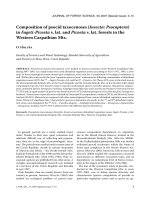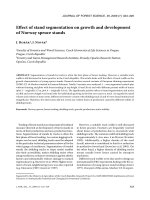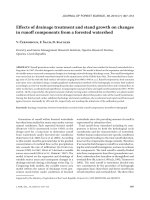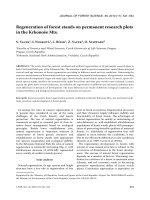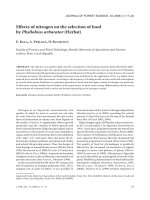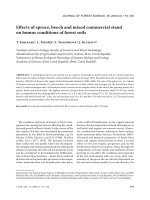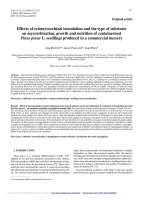Báo cáo lâm nghiệp: " Effects of water deficit on leaf in fast-growing tree species growth and initiation" docx
Bạn đang xem bản rút gọn của tài liệu. Xem và tải ngay bản đầy đủ của tài liệu tại đây (113.1 KB, 3 trang )
Effects
of
water
deficit
on
leaf
growth
and
initiation
in
fast-growing
tree
species
J.C.
Metcalfe
W.J.
Davies
1
J.S.
Pereira
2
1
Institute
of
Environmental
and
Biological
Sciences,
University
of
Lancaster,
Lancaster
LA1
4YQ,
U.K.,
and
2
Department
of
Forestry,
Instituto
Superior
de
Agronomia,
P-1399
Lisboa
Codex,
Portugal
Introduction
Eucalyptus
globulus
is
becoming
increas-
ingly
important
in
Mediterranean
regions
for
pulpwood
production.
Although
the
plant
is
highly
drought
tolerant,
its
high
productivity
seems
to
be
particularly
sensi-
tive
to
water
shortage
(Pereira
et
al.,
1986).
These
researchers
have
shown
that
biomass
production
in
young
E.
globulus
growing
in
the
field
in
Portugal
can
be
increased
by
a
factor
of
3
under
irrigation,
and
this
has
been
related
to
an
increase
in
foliage
area
(Borralho
et
al.,
1987).
Most
of
our
knowledge
on
the
growth
of
tree
seedlings
to
date
comes
from
field
experiments
such
as
the
above.
In
order
to
further
our
understanding
of
seedling
growth,
the
early
growth
patterns
of
juve-
nile
E.
globulus
have
been
investigated
under
conditions
of
water
deficit,
in
conjunction
with
detailed
measurements
of
gas
exchange.
Materials
and
Methods
Experiments
were
conducted
in
Lisbon,
Portu-
gal,
where
E.
globulus
seedlings
were
grown
outside
in
51
plots
of
nutrient-rich
soil.
Plots
were
covered
with
plastic
to
prevent
surface
evaporation
from
the
soil
or
rewetting
by
rain
or
dew.
Plants
were
either
watered
to
drip
point
every
day
or
received
no
water
from
d
0.
Leaf
areas
were
calculated
from
regression
equa-
tions
constructed
using
caliper
measurements
of
leaf
length
and
width
and
direct
values
of
leaf
areas
obtained
with
a
Li-cor
leaf
area
meter.
Gas
exchange
studies
were
conducted
using
a
portable
C0
2
IH
20
porometer
(H.
Walz
Messund
Regeltechnick,
Effe!trich,
F.R.G.).
Results
and
Discussion
Stomatal
conductance
and
photosynthesis
were
both
clearly
reduced
by
soil
drying
(Fig.
1
Although
the
stomata
opened
at
the
beginning
of
the
photoperiod,
they
stayed
open
for
less
time
as
water
stress
developed
and,
after
10
d
without
water,
were
almost
closed
in
the
afternoon.
Photosynthesis
appeared
to
decline
linearly
with
conductance.
In
the
longer
term,
a
decline
in
biomass
production
under
water
shortage
will
result
from
reduced
assimilation
rates
and
a
decrease
in
leaf
area,
and
Borralho
et
aL
(1986)
recently
reported
that
non-irrigated
E.
globulus
had
a
smaller
surface
area
per
unit
of leaf
than
did
irrigated
plants.
Provided
the
soil
water
deficit
was
not
too
severe,
growth
of
the
youngest
leaves
could
still
continue
(Fig.
2),
thus
the
reduc-
tion
in
dry
matter
production
appears
to
be
a
result
of
more
than
purely
a
cessation
of
growth.
Our
current
studies
suggest
that
leaf
initiation
is
important
and,
as
demon-
strated
in
Fig.
3,
the
initiation
of
new
leaves
at
the
apex
of
the
dominant
shoot
is
restricted
with
developing
water
stress.
Indeed,
Hsiao
(1973)
proposed
that
bud
formation
and
leaf
initiation
were
more
sensitive
than
leaf
growth
to
water
deficit
and
these
results
tend
to
confirm
that
view.
In
addition,
Pereira
et
al.
(1987)
have
attributed
the
decreased
foliage
area
observed
with
water
shortage
to
de-
creased
leaf
number.
Our
understanding
of
the
control
of
new
leaf
formation
is
limit-
ed
at
present
and
further
research
is
being
directed
in
this
area.
References
Borralho
N.,
Araujo
M.C.
&
Pereira
J.S.
(1987j
Influence
of
water
supply
in
crown
structure
and
production
of
three
clones
of E.
globulus
in
the
juvenile
phase.
In:
Structural
and
Functional
Responses
to
Environmentat
Stresses:
Water
Shortage
(Kreeb
K.H.,
Richter
H.
&
Hinckley
T.M.,
eds.),
SF’H
Academic
Publishing,
The
Hague
Hsiao
TC.
(1973)
Plant
responses
to
moderate
water
stress.
Annu.
Rev.
Plant
Physiol.
24,
519-
570
Pereira
J.S.,
Pereira
H.,
AraOjo
M.C.,
Linder
S.,
Ericsson
T,
Borralho
N.
&
Leal
L.
(1989)
Opti-
misation
of
biomass
production
in
E.
globulus
plantations.
A
case
study.
In:
Biomass
Produc-
tion
by
Fast
Growing
Trees.
(Pereira
J.S.
&
Landsberg
J.J.,
eds.),
Kluwer,
Dordrecht,
in
press
